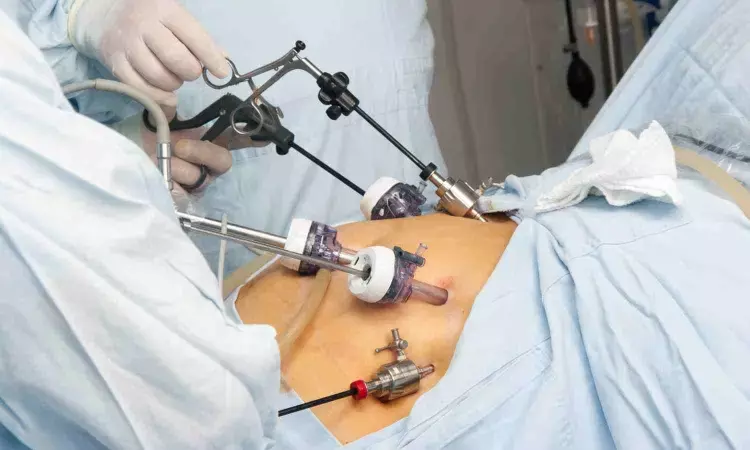- Home
- Medical news & Guidelines
- Anesthesiology
- Cardiology and CTVS
- Critical Care
- Dentistry
- Dermatology
- Diabetes and Endocrinology
- ENT
- Gastroenterology
- Medicine
- Nephrology
- Neurology
- Obstretics-Gynaecology
- Oncology
- Ophthalmology
- Orthopaedics
- Pediatrics-Neonatology
- Psychiatry
- Pulmonology
- Radiology
- Surgery
- Urology
- Laboratory Medicine
- Diet
- Nursing
- Paramedical
- Physiotherapy
- Health news
- Fact Check
- Bone Health Fact Check
- Brain Health Fact Check
- Cancer Related Fact Check
- Child Care Fact Check
- Dental and oral health fact check
- Diabetes and metabolic health fact check
- Diet and Nutrition Fact Check
- Eye and ENT Care Fact Check
- Fitness fact check
- Gut health fact check
- Heart health fact check
- Kidney health fact check
- Medical education fact check
- Men's health fact check
- Respiratory fact check
- Skin and hair care fact check
- Vaccine and Immunization fact check
- Women's health fact check
- AYUSH
- State News
- Andaman and Nicobar Islands
- Andhra Pradesh
- Arunachal Pradesh
- Assam
- Bihar
- Chandigarh
- Chattisgarh
- Dadra and Nagar Haveli
- Daman and Diu
- Delhi
- Goa
- Gujarat
- Haryana
- Himachal Pradesh
- Jammu & Kashmir
- Jharkhand
- Karnataka
- Kerala
- Ladakh
- Lakshadweep
- Madhya Pradesh
- Maharashtra
- Manipur
- Meghalaya
- Mizoram
- Nagaland
- Odisha
- Puducherry
- Punjab
- Rajasthan
- Sikkim
- Tamil Nadu
- Telangana
- Tripura
- Uttar Pradesh
- Uttrakhand
- West Bengal
- Medical Education
- Industry
Study Reveals Increased Risk of Hypoglycemia After Roux-en-Y Gastric Bypass Surgery in Non-Diabetic Patients

A recent study published in Obesity Surgery has highlighted a significant increase in the risk of hypoglycemia in patients who undergo Roux-en-Y gastric bypass (RYGB) surgery, even in those without a prior diagnosis of diabetes.
The propensity score-matched analysis, which compared outcomes in patients with obesity and no diabetes, found that RYGB surgery not only heightened the risk of low blood sugar levels in the short term but also posed a long-term risk for hypoglycemic events. The findings challenge the traditional view that hypoglycemia is mainly a concern for patients with preexisting diabetes.
"RYGB surgery significantly elevated the risk of hypoglycemia in obese patients, including those without diabetes, both in the short and long term. A recent study found that 18.7% of RYGB patients experienced hypoglycemia, compared to 3.8% in the control group (HR 4.3). Over the long term, RYGB patients continued to face a higher risk, with hazard ratios ranging from 5.37 at 1 week to 3.75 at 10 years," the researchers reported.
Roux-en-Y gastric bypass, a widely performed weight loss surgery, is known to improve insulin sensitivity and reduce blood sugar levels in diabetic patients. However, the frequency and long-term risk of hypoglycemia after surgery in patients without diabetes remain uncertain. Therefore, the study aimed to examine the prevalence of hypoglycemia in patients with obesity and without diabetes following RYGB surgery.
For this purpose, the researchers conducted a retrospective cohort study using the TriNetX database. The study included 15,085 patients with obesity (BMI ≥ 30 kg/m²) who underwent RYGB surgery and 3,200,074 non-surgical controls, all of whom had no history of diabetes or use of GLP-1 receptor agonists. Propensity score matching was applied to balance baseline characteristics.
The primary outcome was the incidence of hypoglycemia, defined by ICD-10-CM codes or laboratory values (glucose ≤ 70 mg/dL). Cox regression analysis was used to calculate hazard ratios (HR).
The study led to the following findings:
- In the overall study population, the risk of hypoglycemia was significantly higher in the RYGB group (18.70%) compared to the control group (3.80%), with a hazard ratio (HR) of 4.3.
- After propensity score matching (n = 14,916 per group), the RYGB patients still showed a higher risk (18.70%) compared to the matched controls (5.0%), with a hazard ratio of 3.7.
- Time-series analysis demonstrated consistently higher hypoglycemia risk in the RYGB group, with hazard ratios ranging from 5.37 at 1 week to 3.75 at 10 years post-surgery.
- Subgroup analysis of RYGB patients who developed hypoglycemia showed a 30-day hospitalization rate of 21.3% and a mortality rate of 0.71%.
"While RYGB surgery remains a highly effective treatment for severe obesity, the increased risk of hypoglycemia must be carefully considered when making treatment decisions and planning post-operative care for patients with obesity but without diabetes," the researchers wrote.
"Striking a balance between the benefits of weight loss and metabolic improvements and the potential risk of hypoglycemia is essential to optimize patient outcomes and ensure the long-term success of bariatric surgery," they concluded.
Reference:
https://www.springermedizin.de/increased-risk-of-hypoglycemia-following-roux-en-y-gastric-bypas/50202276
Dr Kamal Kant Kohli-MBBS, DTCD- a chest specialist with more than 30 years of practice and a flair for writing clinical articles, Dr Kamal Kant Kohli joined Medical Dialogues as a Chief Editor of Medical News. Besides writing articles, as an editor, he proofreads and verifies all the medical content published on Medical Dialogues including those coming from journals, studies,medical conferences,guidelines etc. Email: drkohli@medicaldialogues.in. Contact no. 011-43720751


